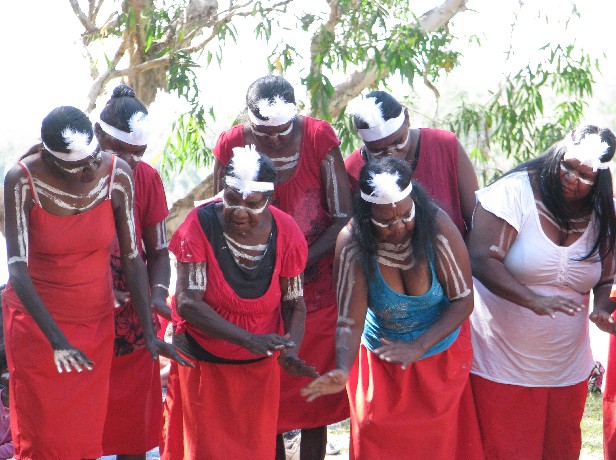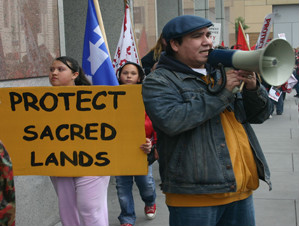 Hailing mainly from the settlement of Borroloola in the Northern Territory, the Yanyuwa are an Australian Aboriginal group whose traditional territory lies on the coastal plain between the Barkly Table lands the Gulf of Carpentaria. Traditionally, the Yanyuwa speak a language also known as Yanyuwa. A member of the Pama-Nyungen family this language is now critically endangered with only 5-15 speakers estimated to be left. Though the Yanyuwa also speak Mara and Garrwa, efforts are under way to save the Yanyuwa language itself through a collaboration between the people and anthropologist John Bradley.
Hailing mainly from the settlement of Borroloola in the Northern Territory, the Yanyuwa are an Australian Aboriginal group whose traditional territory lies on the coastal plain between the Barkly Table lands the Gulf of Carpentaria. Traditionally, the Yanyuwa speak a language also known as Yanyuwa. A member of the Pama-Nyungen family this language is now critically endangered with only 5-15 speakers estimated to be left. Though the Yanyuwa also speak Mara and Garrwa, efforts are under way to save the Yanyuwa language itself through a collaboration between the people and anthropologist John Bradley.
The Yanyuwa have a vibrant spiritual culture and would traditionally use Kujka, dreaming stories, to aid them in their subsistence activities. The Yanyuwa subsistence economy traditionally revolves around hunting and gathering activities on their terrestrial territory and fishing in the Barramundi rich rivers intersecting it. This is how the Yanyuwa have provided for themselves before the relatively recent split into different ‘Times’.
First came the pre-Macassan times, time immemorial on the continent after the world’s creation in the Dream Time. After this came the Macassan times which brought contact with the sea faring Macassan trepangers from the Celebes who came to fish and trade on the Australian coast. Relations between these fishermen and various coastal dwelling aboriginal peoples of the Northern Territory were famously peaceful. Their visits are documented in the rock art of the region and it is thought that it is from the Macassans that the Yanyuwa learnt how to make both dug out canoes and stone lined wells.
Next were the wild times before the first concerted contact with white settlers. Initial contact with explorers was friendly enough and trade relations were amicable. This changed as Borroloola became an important drover station in the heart of Yanyuwa territory. Some moved to the town to try and benefit from it’s wealth but found themselves abused by police, ex-convicts and white settlers a-like and exploited as wage labourers. Those who had not suffered this fate in the towns were challenged in other areas of their territory by encroaching ranching operations. Cattle fouled water supplies and ate vegetable matter vital to the Yanyuwa diet whilst the ranchers themselves often used violence against the Yanyuwa. Many refused to give up their land for some time but were forced, eventually, to concede.
After their traditional lifestyle had been faced down came the cattle times during which a considerable number of Yanyuwa ran their own cattle stations, free to pursue their ceremonial obligations and maintain a degree of autonomy. This did not however prevent the future injustices of the police and welfare times during which the Yanyuwa suffered racial and religious persecution, enforced assimilation and settlement encouraged by the state pre 1973.
The Aboriginal Land Rights Act of 1976 ushered in what is known to the Yanyuwa as the land rights times in which they won title to some of their traditional territory in 1986 and 1989. Despite this positive chronological transition the Yanyuwa still suffer from injustice and lack of political representation today in the tourist times, so called due to the great influx of holiday makers visiting the Northern Territory. This has been both troublesome and confusing for the Yanyuwa as visitors often take spots used by Yanyuwa for fishing and camping and a culture clash is evident due to the under-developed nature of consultative tourism in the region. Yet this has been perhaps the least of the Yanyuwa’s worries as they have fought against mining concessions and expansion as well as the discriminatory Northern Territory Emergency Response in recent years.


